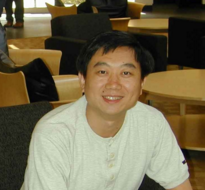- You are here:
- Home
April 25, 2016
| Atlanta, GA
What is your research about?
My research is in a general area called applied and computational mathematics. The primary goal is developing efficient and accurate methodologies, based on modern mathematics, to improve computer simulations for a wide range of problems in science, engineering, and even social sciences. For example: How to find the best path for a robot to travel from one place to another with the least energy cost while avoiding collisions with possibly moving obstacles? How to predict viral news propagation on social media, such as Facebook or Twitter?
What has been the most exciting time so far in your research life?
My research career has brought many exciting times, including having my first paper accepted, receiving an offer from Caltech as a postdoc, and coming to Georgia Tech as an assistant professor. The happiest times were when I collaborated with engineering colleagues, including Ali Adibi and Magnus Egerstedt of the School of Electrical and Computer Engineering. Together we developed methodologies that are now being applied to optical devices for medical imaging, and to robotics. It is very rewarding to see my research in action, and it is even more exciting to discover new challenging mathematical problems emerging from practical problems.
How did you find your way to mathematics research?
I started to like mathematics since I was a kid in elementary school. Having been influenced by my father, who is a high school math teacher, selecting math as my college major was one of the easiest decisions for me. While in college, I wanted to become a high school math teacher after graduation. That changed when I met my Ph.D advisor, UCLA's Tony Chan, in Hong Kong in 1994. He convinced me to pursue a research career in applied and computational mathematics. I still appreciate his advice, and I am very happy with the selection I made.
What advice would you give to a college freshman who wants to be a mathematician?
Keep your curiosity in math as well as other disciplines, such as engineering or science. You will often find that math is essential in other disciplines, and that may motivate you to learn more in mathematics.
If you could not be a mathematician, in what line of work would you be now?
I may want to be an engineer. I am always fascinated by the infinite possibilities in engineering designs, and I am interested in space explorations.
What is the most exciting thing about being a part of Georgia Tech?
I like Georgia Tech students very much. I especially like our students’ attitude of working hard and seeking opportunities to explore challenging problems in academia. I also enjoy the opportunities to work directly with the top engineers in the world.
What are you most surprised about in your encounters with Georgia Tech students?
I am very impressed by our students’ eagerness to learn. On various occasions, students have asked me to lecture on topics beyond the course syllabi.
What is your ideal way to relax?
The best way for me to relax is to be half asleep while watching basketball games on TV. Unfortunately, I haven't watched TV for several years.
What three destinations are still in your travel to-do list?
Rome, Seoul, and Demark. Rome for the history and food, Seoul to observe the Gangnam life style, and Demark for the fairy tales.
If you won $10 Million in a lottery, what would you do with it?
This will not happen because I have never played in a lottery. However, if I won this large sum of money, I will probably set up a scholarship to help qualified graduate students and postdocs to pursue a research life in mathematics.

